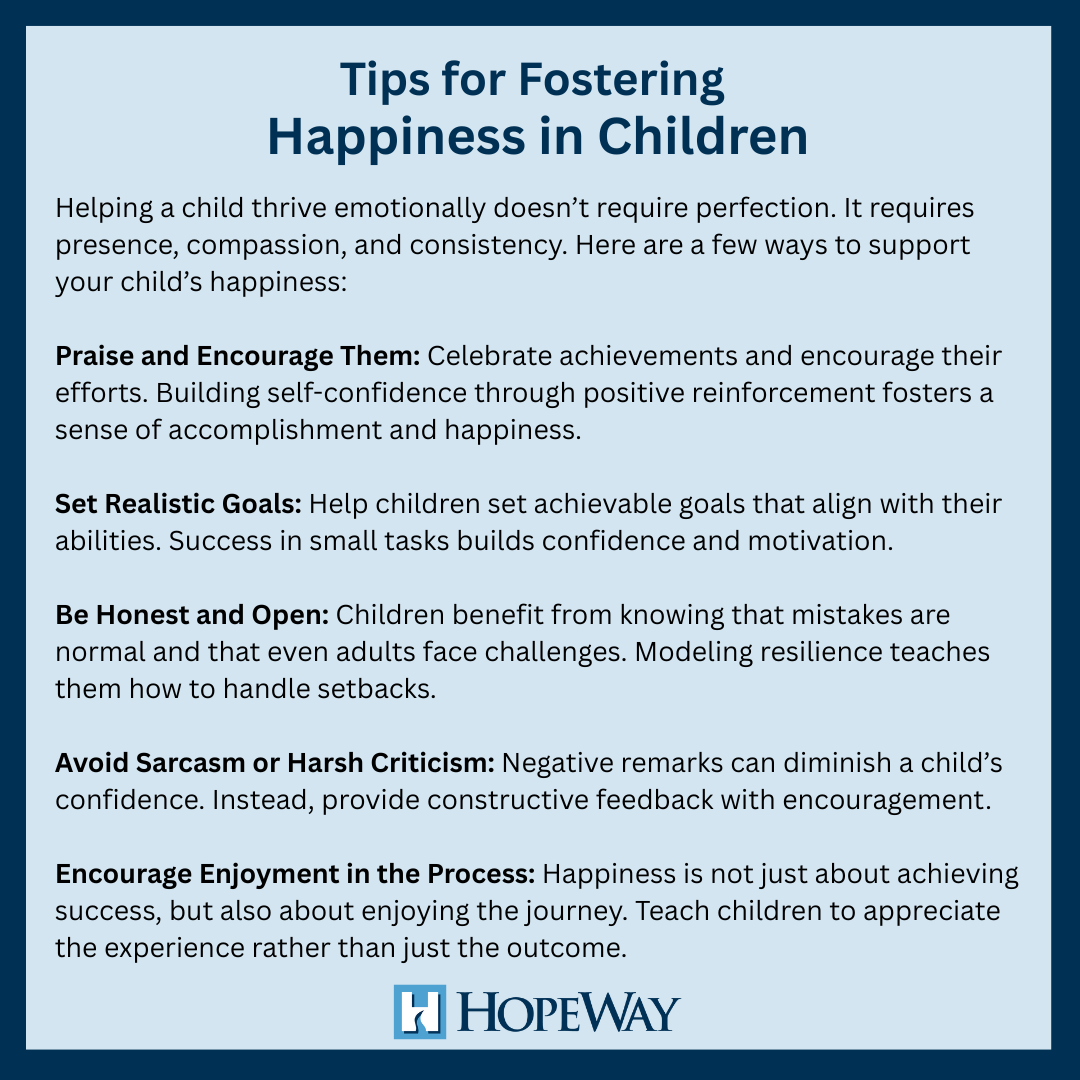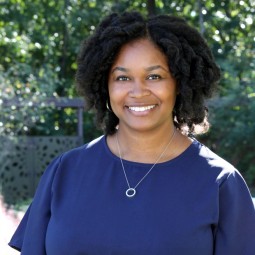Happiness Beyond Smiles
June 30, 2025
Written By Dr. Taren Coley, MD, Psychiatrist & Director of Child & Adolescent Services
A global survey found that 73% of Americans believe raising a happy child is the most important goal of parenting, a view shared in countries such as France and Canada1. But how can you tell if your child is truly happy?
I often remind parents and caregivers that happiness is not just about momentary joy; it’s a reflection of a child’s overall well-being. A happy child feels safe, loved, and free to be themselves. They have room to experience a full spectrum of emotions, including sadness and frustration, without fear or shame.
What Does a Happy Child Look Like?
Happiness in children can show itself in many ways, and as a parent or caregiver, recognizing these signs can help you better understand your child's emotional well-being. While it’s best to foster happiness at a young age, parents and caregivers should keep an eye on the signs of happiness even as a child enters their teenage years.
While happiness is not a constant state, there are key indicators that a child feels safe, loved, and content in their environment. Here are signs to look for:
Laughter and Joyful Expressions: Unlike other learned behaviors, laughter is instinctive, signaling that a child feels safe, comfortable, and free to express their emotions.
Consistency in Their Baseline Behavior: Every child has their own unique temperament and behavioral "baseline." When a child remains consistent in their habits - whether it’s their sleep schedule, eating patterns, or general demeanor - it suggests they feel safe. Sudden, prolonged changes may indicate stress or discomfort.
Self-Confidence and Positive Self-Esteem: A child with high self-esteem is comfortable trying new things, expressing their opinions, and making mistakes without fear of judgment.
Interest in Playing with Others and Making Friends: A happy child actively seeks playtime, particularly with peers. Social interaction is an essential part of emotional well-being.
Curiosity and Asking Questions: Curious children are often happy children. When a child feels safe and secure, they explore their world through questions and curiosity.
Showing Affection and Seeking Connection: A child who willingly gives hugs, seeks comfort from parents, or enjoys being close to family members is demonstrating a strong emotional connection.
It’s Okay to Not Always Be Happy
Research shows that happiness in early life is linked to stronger social connections, better mental health, and greater life satisfaction in adulthood. Happy children tend to build healthy relationships, feel confident, and show emotional resilience2.
However, in today’s social media-saturated world, it can seem like constant happiness is the ultimate goal. Perfect-looking pictures and videos can create unrealistic expectations for both children and parents, leading to guilt or confusion when children feel anything less than joyful.
It’s important to understand that no one is happy all the time, and that’s normal. True well-being includes feeling a full range of emotions. Learning to handle disappointment, frustration, and sadness is part of developing emotional resilience and lifelong mental wellness.

Understanding what happiness truly looks like, beyond smiles, can help families nurture emotional health in a meaningful, sustainable way. Research consistently shows that children who experience a strong foundation of emotional support are more likely to become resilient, confident adults with healthy relationships and better mental health outcomes. By recognizing the many signs of happiness and supporting a child’s emotional development, parents can make a lasting impact that extends far beyond childhood.
About the Author:
 Dr. Taren Coley is double-board certified in General Psychiatry and Child and Adolescent Psychiatry. A native North Carolinian, she earned her Bachelor of Arts in Psychology from East Carolina University and her Medical Degree from the University of North Carolina at Chapel Hill. Dr. Coley remained at UNC to complete her general psychiatry residency training and a child and adolescent psychiatry fellowship. Through her training, she has gained expertise in human development throughout the lifespan and treatment of individuals through psychopharmacology and psychotherapy. At HopeWay, Dr. Coley serves as the Director of Outpatient Services overseeing the clinical operations at HopeWay Psychiatry & Associates, in addition to treating clients at HopeWay. Dr. Coley’s comprehensive and individualized treatment approach helps clients understand and appropriately manage their diagnoses, allowing them to move forward in their recovery.
Dr. Taren Coley is double-board certified in General Psychiatry and Child and Adolescent Psychiatry. A native North Carolinian, she earned her Bachelor of Arts in Psychology from East Carolina University and her Medical Degree from the University of North Carolina at Chapel Hill. Dr. Coley remained at UNC to complete her general psychiatry residency training and a child and adolescent psychiatry fellowship. Through her training, she has gained expertise in human development throughout the lifespan and treatment of individuals through psychopharmacology and psychotherapy. At HopeWay, Dr. Coley serves as the Director of Outpatient Services overseeing the clinical operations at HopeWay Psychiatry & Associates, in addition to treating clients at HopeWay. Dr. Coley’s comprehensive and individualized treatment approach helps clients understand and appropriately manage their diagnoses, allowing them to move forward in their recovery.
References
- Chen, B. B., Van de Vijver, F. J. R., & Hunter, J. A. (2019). Childhood happiness: The role of culture and values. Frontiers in Psychology, 10, 2025. https://www.frontiersin.org/journals/psychology/articles/10.3389/fpsyg.2019.02025/full
- Holder, M. D., & Coleman, B. (2011). The contribution of social relationships to children’s happiness. Journal of Positive Psychology, 6(4), 356–364. https://www.tandfonline.com/doi/abs/10.1080/17439760.2011.536655
Learn More About How to Support Your Childs Mental Health
